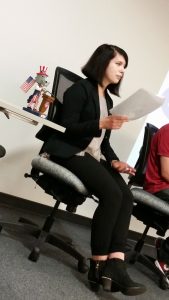After a successful semester of discussing cross-national leadership rhetoric, ENGL 305: Rhetoric and Public Culture students are currently working on their conference papers for Longwood’s Spring Conference of Undergraduate Research. The students also delivered a panel presentation as part of the vice presidential debate-week activities last month at Longwood University.
 On October 6, 2016, Haley Vasquez, Chris Crider, Emi Peterson, Garrett Badgley, Colin Deans, Haley Klepatzki, and Zach Carmon presented to the campus community their collaborative statement on “An Effective Rhetoric for Global Peace and Understanding: Students’ Insights for the Presidential Candidates.” Sponsored by Longwood’s Office of International Affairs, the interactive session aimed to promote an understanding of how our presidential candidates can and should function on a world stage when the goal is to foster global peace and understanding. Following students’ presentation on the current climate of U.S. presidential rhetoric, Dr. Elif Guler engaged the audience in a discussion of how the principles of rhetoric can be shared on a global, regional, and local stage.
On October 6, 2016, Haley Vasquez, Chris Crider, Emi Peterson, Garrett Badgley, Colin Deans, Haley Klepatzki, and Zach Carmon presented to the campus community their collaborative statement on “An Effective Rhetoric for Global Peace and Understanding: Students’ Insights for the Presidential Candidates.” Sponsored by Longwood’s Office of International Affairs, the interactive session aimed to promote an understanding of how our presidential candidates can and should function on a world stage when the goal is to foster global peace and understanding. Following students’ presentation on the current climate of U.S. presidential rhetoric, Dr. Elif Guler engaged the audience in a discussion of how the principles of rhetoric can be shared on a global, regional, and local stage.

Haley Vasquez introducing the panel presentation
Some excerpts from the students’ insights shared with the Longwood community:
“Rhetoric refers to the purposeful use of language and the classic art of making effective arguments. Plato suggested that rhetoric should be used to find the truth and achieve justice. Aristotle defined it as the use of the available means of persuasion. Quintilian said only good and virtuous men should practice the art of rhetoric. Various other key figures across cultures and nations also studied rhetoric and offered their own definitions and interpretations of this art.”
“The presidential candidates seem to make various arguments. The question is: are these effective arguments?”
“Jay Heinrichs, a persuasion guru who has applied rhetorical principles, from business transactions to family quarrels, observes that ‘We need to distinguish rhetorical argument from the blame-shifting, he-said-she-said squabbling that defines conflict today. In a fight, each disputant tries to win. In an argument, they try to win over an audience’ (Thank You for Arguing).”
“Albert Einstein once said: ‘The world is a dangerous place, not because of those who do evil, but because of those who look on and do nothing.’ We concur with this statement, but we also contend that the world is a dangerous place because of those who say nothing or say the wrong thing. We hope that our presidential candidates work to achieve global peace and understanding by awakening the idea that it all begins with their use of language. Rhetoric is more than a tool of persuasion–it is the fundamental difference between conflict and progressive argument.”

From Left: Dr. Emily Kane (Office of International Affairs), Haley Vasquez, Colin Deans, Haley Klepatzki, Dr. Elif Guler (Deparment of English and Modern Languages), Zach Carmon, Emi Petterson, Garrett Badgley, and Chris Crider
*Photos courtesy of Shirley Blackwell and Elif Guler.
